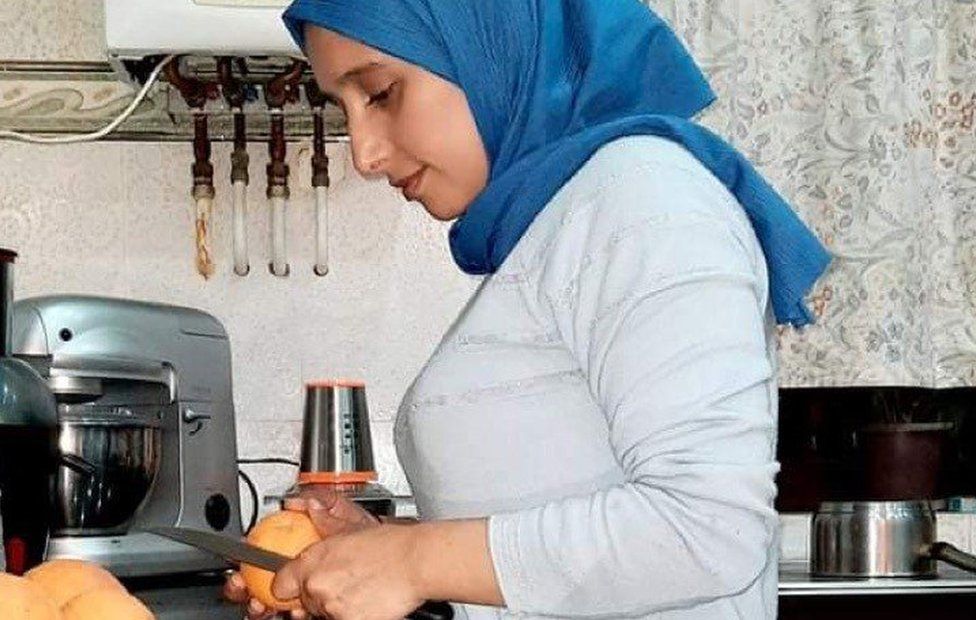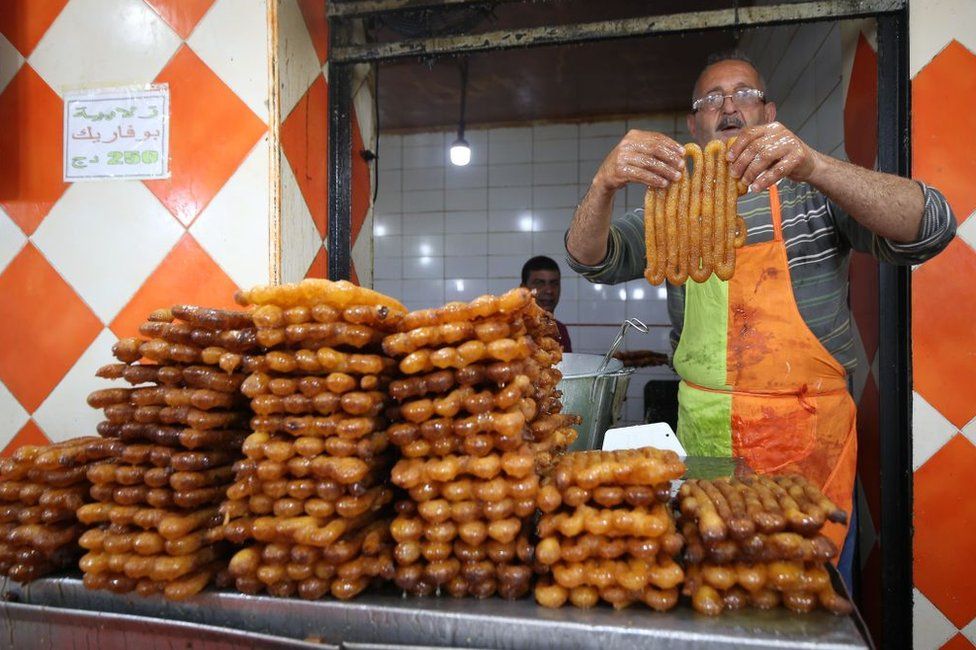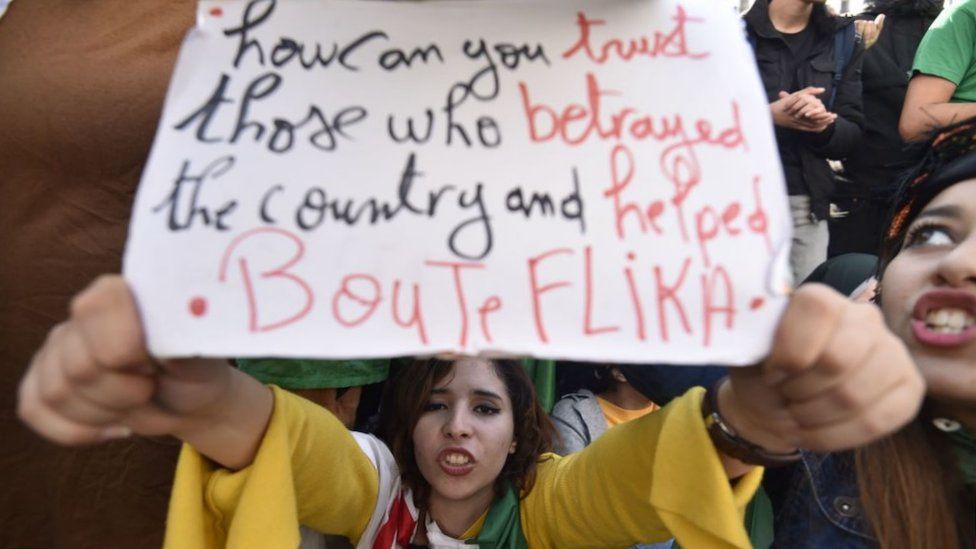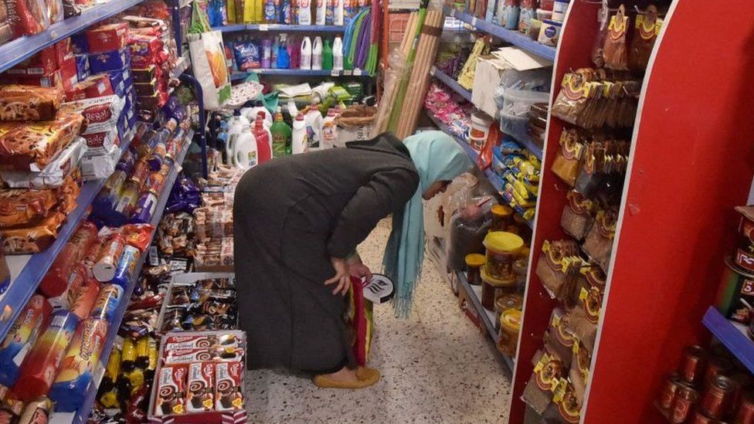Food prices are climbing sharply in Algeria, where shoppers say cooking oil and milk are so scarce that you need to butter up shopkeepers to get any.
The impact of measures to deal with first the coronavirus pandemic and now the war in Ukraine is making life hard for consumers.
"It feels like buying drugs," says Samiha Sammer, 31, with a mixture of cynicism and revulsion.
She used to love making cakes for family and friends, even making a side income from her passion, but can no longer find all the ingredients she needs.
"To buy cooking oil from any grocery shop, you need to be an acquaintance of the shop owner," Ms Sammer explains.
The exchange usually takes place discreetly, with the precious supply kept hidden at the back of the shop.
Like many Algerians she first noticed things changing last year, as Covid measures began to bite.
Now, with the Muslim fasting month of Ramadan due to start at the weekend, Algerians have been stepping up efforts to get hold of cooking oil as it's a vital ingredient in so many of the special dishes eaten during the month.
Ms Sammer sometimes finds herself travelling from her home in Blida to the nearby small town of Kolea, where fruit and vegetables are slightly cheaper.

These days potatoes are 30% more expensive than just a few months ago, and long queues for milk mean people queue before sunrise to secure some for their families.
"I've now stopped doing that as it involves pushing around crowds and sometimes fighting to get your share of the milk," the administration clerk says with a sigh. "It's humiliating."
But avoiding the crowds comes at a cost.
She now pays about 420 dinars ($2.90; £2.20) for 1kg of privately imported powdered milk instead of 25 dinars for the state-subsidised kind.
Algeria produces milk but only in small quantities, so for years it has relied on imports from France, other EU countries and more recently the United Arab Emirates - usually in the form of a powder that is liquified in local factories before reaching consumers.
What bothers Algerians most of all, though, is cooking oil.
Like milk, it is subsidised by the state, but even before the current crisis, the oil was already expensive - a five-litre bottle will set you back at least 600 dinars ($4.20; £3.20).

Compared to Algeria's monthly average salaries of $240 for private sector workers and $410 for public sector workers, it is little wonder the pressure has been mounting on the authorities to act.
Hoarding food and corruption have increased as a consequence of the country's economic hardships, as a parliamentary select committee found in a damning report.
Committee member Hisham Safar told the BBC that cooking-oil traders artificially inflate the amount of subsidised goods they sell in order to claim more money back from the government.
Last year, about 150,000 violations were reported to the authorities, most of which ended up in court, and thousands of trading permits were confiscated.
But there is also a problem with the smuggling of subsidised goods across Algeria's southern border to be sold in neighbouring countries, which the parliamentary commission described as "prevalent".
No official figures exist but sources tells the BBC as many as 12 lorry loads of cooking oil were smuggled from Algeria into Mali and Niger every day.
The culprits sell the state-funded, Algerian-made cooking oil in hard currency - taking a profit of up to $17,800 per lorry load, sources told the BBC.
Earlier this month, President Abdelmadjid Tebboune banned the export of any food items that contain ingredients that were originally imported - such as cooking oil, sugar, pasta, semolina and other wheat products.
Reports suggest the president wants such acts to be penalised as "economic sabotage".
But to find the deeper causes of Algeria's crunch you have to look back further, experts say.
'Mafia looted the country'
The economy's reliance on the sale of gas and crude oil as an engine for growth and a source of government revenue has created many problems, according to economist Abdal-Rahman Hadef.
Not least the mismanagement of the sector with many deals happening on the parallel market, costing the treasury huge amounts of money, Mr Hadef adds.
There is also concern that the economic problems could lead to further political unrest.
The rising prices "might reach a point where the already weak links between rulers and ruled could break, causing a great deal of discontent amongst the population", warns sociologist Prof Rachid Hamadouche.

The former president, Abdelazziz Bouteflika, was forced to step down in 2019 in the face of widespread popular protests.
His successor, who was once a close ally, now repeatedly denounces the "mafia which looted the country's coffers" under Bouteflika.
Despite the change of president, many young people remain disgruntled and continued to take part in regular street demonstrations until the pandemic struck in March 2020.
Three-quarters of the population is under the age of 37, and unemployment has reached 11%, with many of the jobless being university graduates.
With an eye on easing the pain, the government has said that from this month, unemployed people who can prove they have been actively looking for work will receive a monthly allowance of about $90.
Ironically, it is the global rise in gas prices resulting from the war in Ukraine that means that the authorities can afford to pay out this money in the short term.
But economists insist that Algeria cannot afford to squander the latest windfall from gas revenues in the same way the potential boost from oil revenue over the past 20 years was lost.
But for now, shoppers like Ms Sammer are stuck desperately seeking out the best deals and hoping that a friendly shopkeeper will give them access to a squirrelled-away stash of cooking oil.
Latest Stories
-
Medical Council to enforce specialist distribution nationwide
10 mins -
Fire guts old Fadama market, man reportedly loses GHC800,000
15 mins -
Nacee bemoans low performance fees for gospel artistes
16 mins -
We don’t operate investment platform – GNPC
32 mins -
Ghana Fact-checking Coalition condemns disinformation on voting by Wontumi FM broadcaster
34 mins -
IFRS 17 will augment and accelerate NIC’s efforts to implement risk-based capital – Deloitte
36 mins -
IFRS 17 is one of biggest changes to financial reporting standards in insurance industry – Deloitte
50 mins -
Enimil Ashon: Whose polls do you believe: ‘Global Info or Prof Sarpong?
52 mins -
Ghana Climate Innovation Centre welcomes 25 businesses into Cohort 10
57 mins -
ADB will continue to enhance customer value and service experience – Managing Director
59 mins -
Colour Cure Exhibition highlights art’s role in healing and advocacy
1 hour -
GPL 2024/25: Aduana FC sack coach Yaw Acheampong after poor run
1 hour -
John Dumelo pays ¢10,400 in outstanding fees for visually impaired law student facing deferral
1 hour -
CHRAJ clears Rev. Kusi Boateng of conflict of interest, says he doesn’t own 2 passports with different names
1 hour -
We’ll restore hope by cutting down taxes and avoiding unreasonable borrowing – Ato Forson
1 hour

